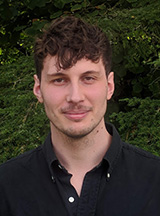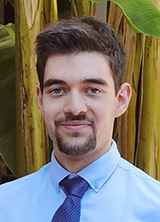New students 2020
Kate Barney

Kate graduated from the University of Sheffield with a degree in Biomedical Sciences with a Year in Industry. She will be supervised by Dagmar Scheel-Toellner and Karim Raza at Birmingham University and co-supervised by Amy Anderson and John Issacs at Newcastle University. Kate will be investigating the functional consequences of IgA capture in FcRL4+ cells in rheumatoid arthritis to understand the cells antigen presenting capabilities and their consequential interactions with T cells to over activate the immune system.
Daniel Becker
 Project title: defining the key tolDC derived signals involved in inducing T-cell tolerance
Project title: defining the key tolDC derived signals involved in inducing T-cell tolerance
Daniel graduated from University of Warwick with a BSc in biochemistry before then studying an MSc in immunology at the University of Oxford. During his MSc he studied the biophysical characteristics of membrane models used to reconstitute immune signalling at the plasma membrane in a simplified but controllable fashion. Daniel has now joined Michael Dustin’s lab at the Kennedy Institute of Rheumatology under co-supervision by Catharien Hilkens from Newcastle University. During his PhD Daniel aims to use model membranes to better elucidate the key signalling mechanisms tolDCs employ to induce T-cell tolerance, a crucial interaction that prevents aberrant inflammatory responses towards self antigen otherwise common in many autoimmune diseases.
Bogdan Didov

Bogdan graduated from the University of Aberdeen with an MSci in Biotechnology, specialising in Epigenetics and Biochemistry. During his industrial placement year at GlaxoSmithKline he worked in a department focused on immuno-inflammation where he was tasked with the development of a model for human Th17 cell in vitro differentiation. Bogdan is now supervised by Carl Goodyear in Glasgow, and co-supervised by Kim Midwood in Oxford. He is looking at the epigenetic suppression of anti-inflammatory metabolic pathways in rheumatoid patient myeloid cells. This is with particular focus on the impact that the RA-associated DAMP tenascin-C has on the itaconate anti-inflammatory pathway.
Annabelle Ferguson

Project title: Investigating the importance of intestinal inflammation in seronegative arthritis.
Annabelle graduated from the University of Glasgow in 2020 with an Honours Degree in Immunology. She is supervised by Simon Milling and Stefan Siebert in Glasgow, Catharien Hilkens in Newcastle, and Paul Bowness in Oxford. Her project aims to understand interactions between the intestinal immune system and systemic pathology in people with seronegative arthritis. She aims initially to investigate the effects of HLA-B27 on mucus secretion by goblet cells, and the roles of regulatory T cells in the intestine of people with ankylosing spondylitis.
Jack Glendinning

Project Title: Bcl-3 as a mediator of immune dysregulation in CD4+ T-cells of early rheumatoid arthritis
Jack graduated from the University of Birmingham with an MSc in Immunology and Immunotherapy and then worked as a lab technician at a phase 1 clinical trial research centre for the pharmaceutical company Covance.
Jack is now undertaking a PhD under the supervision of Drs. Arthur Pratt, Ruaidhri Carmody and Amy Anderson looking into a potential new therapeutic target for rheumatoid arthritis called Bcl-3, which is present at high levels in certain immune cells of the blood during the earliest stage of the disease.
At the University of Glasgow, he will begin to investigate the function of this molecule in detail, first developing a new experimental technique to enable its levels to be controlled in human immune cells. Jack will continue this work at Newcastle University, where he will explore how different Bcl-3 levels in these cells might “programme” them to cause disease. In parallel Jack will measure Bcl-3 in the joint lining of patients with early stage rheumatoid arthritis compared with other types of arthritis. Investigating these areas will inform whether Bcl-3 inhibition by drugs might help to treat Rheumatoid Arthritis.
Emma Jackson

Project title: Biomaterial-based therapeutics for in vivo induction of tolerogenic dendritic cells (BioTol)
Emma graduated from Newcastle University in 2020 with a 1stclass degree in Biomedical Sciences. The goal of her RACE2 PhD project is to develop a novel immunotherapeutic tool that will restore immune tolerance in rheumatoid arthritis patients. To this aim she will engineer and test a biomaterial-based ‘scaffold’ that upon injection will form a protected space, in which dendritic cells can be reprogrammed to become tolerogenic. Emma will be supervised by Catharien Hilkens and Katarina Novakovic (Newcastle University) and James Brewer and Paul Garside (University of Glasgow).
Jean-Baptiste Richard

Project title: Using changes in the synovial microenvironment to define disease progression and treatment response in rheumatoid arthritis
Jean-Baptiste graduated from Imperial College London with a BSc in Biology in 2019. During that time, he worked for a year as a research associate within the Immunology and Inflammation department of Pfizer Inc. in Cambridge, Massachusetts. He then graduated with a distinction from the University of Oxford with an MSc in Integrated Immunology in 2020. Jean-Baptiste is now based at the Kennedy Institute of Rheumatology in Oxford, supervised by Kim Midwood and Christopher Buckley. His PhD project will define how changes in the composition and organization of the extracellular matrix in the synovium of people with rheumatoid arthritis contribute to chronic inflammation. Using a combination of bioinformatic and wet-lab approaches, the goal is to reveal novel mechanisms underlying disease progression and to better understand treatment response.

